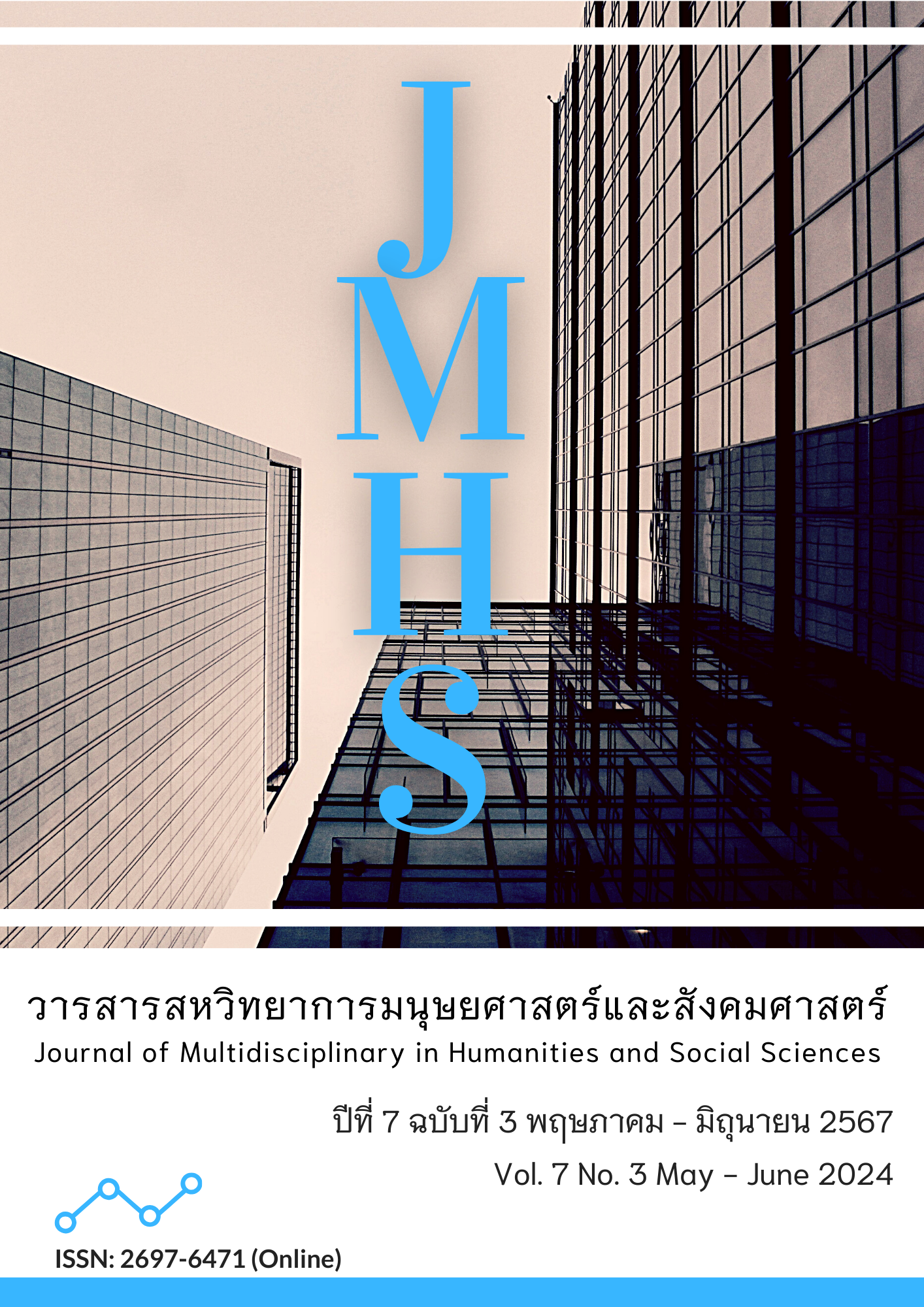The Dhammadhippateyya Development of Governance in the Context of a New Thai Society
Main Article Content
Abstract
The research had the following objectives: 1) to study the principles of Dhammadhippateyya as one of the main teachings in Buddhism; 2) to study the principles of Dhammadhippateyya and the development of government in the context of the new Thai society; and 3) to propose guidelines for promoting the application of the principles of Dhammadhippateyya. It was qualitative research. The population or key informants used in the research were obtained through in-depth interviews with 30 people and focus group discussions with 13 people. The data was analyzed using descriptive content analysis.
The research results were found as follows: 1. The Buddha followed the principles of Dhammadhippateyya. In summary, the administration of the four Buddhist companies adheres to nine principles: 1) Peace principles: His Majesty has goals, which are ideals and strategies, that aim to seize the welfare and well-being of the people to have a good life and have peace. 2) The Buddhist Organization lays down the principles of work management. It requires working together toward the same goal. To solve problems or create understanding among monks. 3) Buddhist planning involves adhering to the principles of the Four Noble Truths. 4) Buddhist expertise, "Ettakka." 5) Buddhist conflict management is an administration that helps reduce conflicts. 6) Buddha Service: His Majesty has laid down principles for providing services to the people. 7) Buddhist ethics of governance He ruled the Sangha with righteousness and examined the practices of the Sangha together. 8) Buddha Sappaya, living according to the environment, and 9) achieving Buddhist results. The goal of becoming a Buddhist is happiness, peace, and nirvana.
2. Dhammadhippateyya and governance development in the context of the new Thai society that requires a person to try to study the concept as well as apply the principles of Dhammadhippateyya in a Thai society that is continuously developing. This is to promote awareness of democratic politics as well as the current political and administrative situation under the democratic governance structure. Dhammadhippateyya is a governance approach that emphasizes the principles of justice. Holding Dhamma as the main principle in governing in the present and in the future
3. Guidelines for promoting the application of the principles of Dhammadhippateyya in the development of government in the context of the new Thai society, namely (1) principles in the way of life of Thai people (2) principles in governing the country (3) being the center of the mind (4) being the source of Thai culture (5) being the main institution of Thai society (6) being the foundation of culture (7) being a national heritage (8) being a national identity (9) being a position that helps create civilization (10) status that helps create peace in the world.
Article Details

This work is licensed under a Creative Commons Attribution-NonCommercial-NoDerivatives 4.0 International License.
Views and opinions appearing in the Journal it is the responsibility of the author of the article, and does not constitute the view and responsibility of the editorial team.
References
กัลยกร สังขชาติ, ขันทอง ใจดี และ วันจักร น้อยจันทร์. (2563). ปัจจัยที่มีผลต่อความผูกพันในองค์การของกำลังพลกรมทหารพรานที่ 42 ตำบลท่าประดู่ อำเภอนาทวี จังหวัดสงขลา. วารสารวิจัยและพัฒนา มหาวิทยาลัยราชภัฏสวนสุนันทา, 11(2), 154-169.
จักรวาล สุขไมตรี. (2562). การบริหารตามสังคหวัตถุ 4 ขององค์การบริหารส่วนตำบลพะตงอำเภอหาดใหญ่ จังหวัดสงขลา. วารสารราชพฤกษ์, 17(2), 105-111.
นิยม เวชกามา. (2562). รูปแบบการมีส่วนร่วมทางการเมืองในระบอบประชาธิปไตยของประชาชนชาวสกลนครตามแนวพุทธจิตวิทยา(วิทยานิพนธ์พุทธศาสตรดุษฎีบัณฑิต). มหาวิทยาลัยมหาจุฬาลงกรณราชวิทยาลัย.
พจนานุกรม ฉบับราชบัณฑิตยสถาน. (2542). พจนานุกรมฉบับราชบัฯฑิตยสถาน พ.ศ. 2542. กรุงเทพฯ: อักษรเจริญทัศน์.
มหามกุฏราชวิทยาลัย. (2525). พระไตรปิฎกภาษาบาลี ฉบับสฺยามรฏฺ เตปิฏกํ 2524. กรุงเทพฯ: โรงพิมพ์มหามกุฏราชวิทยาลัย.
พระพรหมคุณาภรณ์ (ป.อ. ปยุตฺโต). (2555). พจนานุกรมพุทธศาสตร์ ฉบับประมวลธรรม. (พิมพ์ครั้งที่ 23). กรุงเทพฯ: ผลิธัมม์.
พระครูอรุณสุตาลังการ (ปรีดา ขนฺติโสภโณ). (2561). รูปแบบการพัฒนาความเป็นธรรมาธิปไตยของผู้นำชุมชนในเขตอำเภอเมืองจังหวัดนครศรีธรรมราช. วารสารมหาจุฬานาครทรรศน์, 5(2), 364-376.
พีรพัฒน์ ใจแก้วมา. (2563). การศึกษาพฤติกรรมการดำรงชีวิตแบบปรกติใหม่ของประชาชนชาวไทยระหว่างวิกฤตโควิด-19(วิทยานิพนธ์หลักสูตรปริญญาวิทยาศาสตรบัณฑิต สาขาภูมิศาสตร์ คณะเกษตรศาสตร์ ทรัพยากรธรรมชาติและสิ่งแวดล้อม). มหาวิทยาลัยนเรศวร.
พุทธทาสภิกขุ. (2531). การเมืองคือธรรมะ. (พิมพ์ครั้งที่ 2). กรุงเทพฯ: อรุณวิทยา.
ภัชลดา สุวรรณนวล, และ ระพิน พุทธิสาโร. (2564). การบริหารจัดการชุมชนตามหลักสังคหวัตถุ 4. Journal of MCU Nakhondhat, 8(2), 325-336.
อนุชา พละกุล. (2563). การวิเคราะห์โลกทัศน์ทางการเมืองของเยาวชนที่มีต่อรัฐบาลไทย ช่วง พ.ศ. 2563. วารสาร มจร เพชรบุรีปริทรรศน์, 3(1), 61-75.
อนุรักษ์ นิยมเวช. (2554). บทความเกี่ยวกับการพัฒนาการเมืองและการมีส่วนร่วมของประชาชน. กรุงเทพฯ: สำนักงานเลขาธิการวุฒิสภา.
Public Health Administration Division Ministry of Public Health. (2018). Summary of the Meeting of the Sub-Committee on Establishment and Management of Treatment Services for Coronavirus Disease 2019 (COVID-19), Busarakham Hospital. Nonthaburi: Ministry of Public Health.


